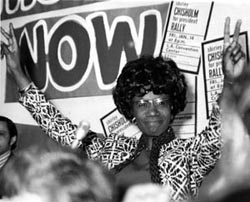With so much emphasis place on today's political climate, especially regarding the election, it is very refreshing watching a documentary like Chisholm '72: Unbought & Unbossed. It's even better that this is an insightful and informative documentary about Shirley Chisholm, who will forever occupy a place in American history. She was the first black woman elected to Congress. In 1972, Chisholm was the first woman to run for President. Not only that, she was the first African American to run for President. That's pretty revolutionary, given that in the intervening years Jesse Jackson is the only other candidate (black or female) to attract that kind of attention. And Alan Keyes and Rev. Al Sharpton don't count. Writer/director Shola Lynch does an excellent job of setting the political climate of the time, and telling Chisholm's story on both a personal and political level.
Her bid for the Presidency came out of nowhere. Like all good candidates, especially ones who do not have a chance (remember Dennis Kucinich?), she never acknowledged that she had no chance of winning. She ran to get her issues out in the open. Her message resonated with younger voters, and, much to the surprise of many pundit, began racking up delegates that ensured she would have a voice at the Democratic convention. She also persevered until the end, despite a crowded field that included Edmund Muskie, George Wallace, and George McGovern (who eventually lost to Nixon). Others have pursued similar strategies since, most notably Ross Perot (who succeeded wildly in pushing to the forefront the issue of a balanced budget) and Ralph Nader. And, like many, people didn't take her too seriously. Who does she think she is? She has only two congressional terms under her belt and she thinks she can be President?
What is particularly interesting is how the political establishment, especially groups that one would think would support her, like NOW and the Congressional Black Caucus. These sections show that the politics of yesteryear are the same as politics today. It is all about compromise jockeying for power. The Black Caucus did not throw its support behind Chisholm, which seems bizarre, and did cause a minor rift in some of its members. They went with the candidate they felt would win, hoping to gain political power. NOW was much more torn. Yes, she was a woman, but she was also black, and didn't have much of a chance of winning. Her very presence was polarizing, but at the same time inspiring.
Lynch interviews a number of people who met Chisholm while she was campaigning, and it was obvious that she had an effect upon them. Archival footage shows her as determined, sharp, and able to answer questions the way she wanted to, a must for anybody in politics. She also interviews Chisholm today, looking back upon 1972. Chisholm today looks back fondly and seems less angry than before. Then again, most of the old footage is news footage from campaigns, and anybody would look angry. The effect she had on politics is much more quieter than many would think. With her populist positions and stubborn will to stay in the race, people saw that even the most unlikely people could have a say in national politics. Volunteers in her campaign became civic-minded lawyers and congressmen. She states that she does not want to be remembered as the first black woman to run for President, but because of the way history works, she will be. Chisholm was much more than this, and it will be unfortunate is if this is the only way people remember her.
